To obtain high yields, cucumbers must be shaped. The formation of cucumbers in a greenhouse and open ground is different. What is suitable for protected soil is unacceptable when growing crops outside. In addition, the formation of varieties is very different from the formation of hybrids.
| Content:
|
Why do you need to shape cucumbers?
There are many reasons for this:
- shaping significantly increases the yield of varietal cucumbers;
- preventing borage from thickening, which in turn is disease prevention;
- correctly formed cucumbers are evenly illuminated along the entire length of the vines;
- agricultural practice allows you to direct all the forces of the plant to the formation and growth of greenery;
- pollinating insects are free to visit all flowers on the plant.
In the absence of pinching, removal of leaves and side vines, one should not expect a good harvest. This especially applies to greenhouse cucumbers.
Formation of greenhouse cucumbers
It is impossible to grow a good harvest of cucumbers in a greenhouse without their proper formation. Formation greenhouse cucumbers depends on whether the hybrid or variety is grown.
Rules for forming cucumbers:
- Pruning leaves and pinching shoots is carried out in the morning so that the wounds have time to dry out and heal during the day. If you pinch cucumbers in the evening, then at night they actively evaporate water and through a wound that has not healed, the plant can lose a significant amount of liquid. In addition, fresh wounds easily become infected;
- pinch shoots no more than 10 cm long. If a long lash has already formed, then it is better to pinch only the tip. Removal of vines with 4-5 formed leaves is difficult for plants to tolerate;
- the lower part of the stems should not be allowed to thicken, otherwise excess moisture will appear there and diseases will begin to develop;
- when growing cucumbers in a greenhouse, the stem is always directed upward, regardless of whether the plant is formed into one or more vines;
- If necessary, remove yellowed, diseased leaves and barren flowers;
- Every 10-14 days, the 2 lower leaves are torn off, since they take a lot of juice and thicken the root part. More than 2 leaves should not be removed at once, as this may weaken the lash;
- Cucumber lashes should not be turned over too much. As the stem grows, it is wrapped around the trellis.
Formation of hybrids
Hybrids have a female type of flowering; they have practically no male flowers (barren flowers). Female flowers are formed both on the main stem and on the side shoots, but to prevent thickening, hybrids in the greenhouse are formed into one stem. If cucumbers are not formed in a greenhouse, even if diseases do not appear in such thickets (which is unlikely), then it is impossible to feed such a plant to obtain not only a good, but even a more or less mediocre harvest. There are practically no Zelentsovs in thickened plantings, despite the abundance of female flowers.
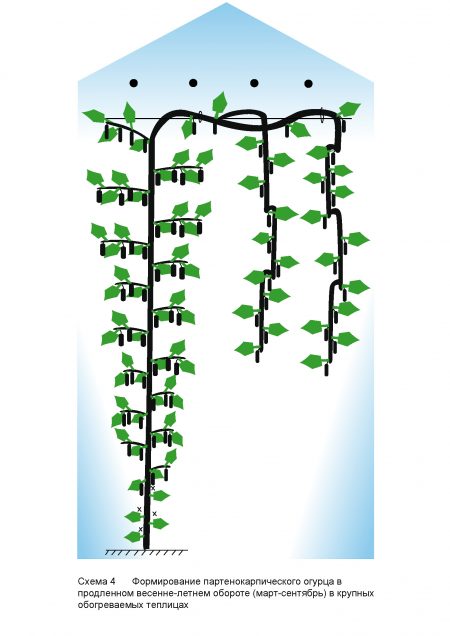
Hybrids begin to form when they have 3-4 true leaves, not counting the cotyledons.
- Each plant is tied to twine attached to a trellis almost under the ceiling of the greenhouse. The height of the trellis should be at least 2 m. The plants are tied up carefully, without tightening the loop too much, since with further growth the stem thickens and the twine can cut deep into the tissue.
- The cucumbers are tied under 3-4 leaves, and the free lash is twisted onto twine.
- Every 2 weeks, if the whip does not cling to the support enough, it is tightened.
- Removing all flowers, shoots and ovaries from the axils of 4 true leaves. The lower flowers and ovaries form too early, when the plant is not yet strong.In addition, they absorb too many nutrients, inhibiting further shoot growth. If you save them, the cucumbers will spend all their energy on them and there will be no harvest in the future. Removing the first flowers and ovaries allows the crop to form a powerful root system and become significantly stronger, which leads to a bountiful harvest of greens.
- When the crop has 7-8 true leaves, remove the 2 lower leaves. Subsequently, the lower leaves are removed at intervals of 10-14 days.
- From the 5th to 9-10th leaf on the main stem, a side shoot is left, which is blinded after the 2nd leaf. On second-order shoots, flowers and ovaries are not cut off. With proper feeding, the main harvest of greens is harvested from them.
- From the 10th leaf on the main stem, the emerging side shoots are pinched after the 3rd leaf.
- When the main stem reaches the trellis, it is thrown over it and allowed to grow another 0.7-1 m, after which it is blinded. The side shoots that form here are not pinched. This makes it possible to get a third wave of fruiting in greenhouse cucumbers.
If it is not possible to feed the hybrids (this is especially difficult to do on poor soils), then along the main stem, all developing side shoots are completely plucked out until the plant is thrown over the trellis. After this, the top of the main shoot is immediately removed and the second-order lashes are allowed to grow freely, plucking out the emerging side shoots. The harvest of greens in this case is formed on the main stem, and later on the growing vines of the 2nd order. It will be slightly lower, but still quite large.
Correct formation of bee-pollinated varieties
Bee-pollinated varieties are usually not grown in a greenhouse because there are not enough pollinating insects in such conditions. But sometimes you have to grow even varietal cucumbers in a greenhouse. They are formed differently.
They produce predominantly male flowers on the main stem; there are practically no female flowers. They begin to appear in large numbers on shoots of the 2nd and subsequent orders. This feature of varieties is taken into account when forming varieties grown in greenhouse conditions.
- Pluck out all shoots, flowers and ovaries up to the 4th true leaf.
- Above the 4th true leaf, the main stem is also pinched. The second-order shoots formed here are each wrapped separately around twine and directed vertically upward. These 1-2 shoots replace the main stem. Much more female flowers appear on them, but when growing cucumbers in a greenhouse, most of them need to be pollinated by hand.
- On replacement vines, all newly formed shoots and flowers are removed up to the 3rd leaf.
- From 4 to 7 internodes, a lateral shoot of the 3rd order is left, blinding it after 3-4 leaves.
- When the replacement main stems reach the trellis, they are blinded. The shoots that form at the top are allowed to grow freely and branch, making sure, however, that stems of 4-5 orders do not appear on the lashes. On vines of 2-3 orders the most abundant harvest of cucumbers is obtained.
The lower leaves of bee-pollinated cucumbers begin to be removed when the third true leaf appears on the replacement vines. There is no need to do this earlier, since cutting off the lower leaves too early weakens the plants.
Formation of cucumbers grown in barrels
A new way to grow cucumbers, which is becoming increasingly popular.The method of forming such cucumbers is very similar to the formation of plants in a greenhouse, although the crop is grown in the open air.
When grown in a barrel, cucumber vines are directed toward the ground and grow from top to bottom. The shoots do not cover the roots from the influence of external factors, therefore, when forming such cucumbers, the first basal leaves are not removed. They protect the roots from drying out and overheating.
Formation of hybrids.
- As with greenhouse cultivation, all shoots and ovaries from the axils of the first 3-4 leaves are plucked out of hybrid cucumbers. The leaves themselves are not removed until they begin to turn yellow and dry naturally.
- After the 4th leaf, one side shoot is left in the axils, blinding them after the 3rd leaf. When the stem reaches the ground (13-16 leaves), it is pinched, and side shoots are allowed to develop at the top.
There is no need to form third-order vines, since it is not possible to feed such green mass. All nutrition will go to the growing canes to the detriment of the harvest, and hybrids require 2-3 times more nutrients than varieties.
Formation of varieties. The main stem of the varieties is pinched after the 3rd leaf, the side shoots that appear are also blinded after the 3-4th leaf. Next, the crop is allowed to branch and no longer be pinched. On the vines of the 3rd and subsequent orders there will be mainly only female flowers.
Since several plants are grown in a barrel at the same time, one of them is formed exclusively into one stem, plucking out all the side shoots. This is necessary for pollination. There will be many male flowers on the main stem of such a cucumber. Later, after 5-7 leaves, you can pinch it.Female flowers will appear on shoots of the 2nd order, but there will still be enough empty flowers and enough to pollinate all plants. Usually one such plant is enough to pollinate cucumbers in 2-3 barrels.
Formation of cucumbers in open ground
IN open ground, unlike in a greenhouse, cucumbers are grown spread out and on a trellis. But when grown on a trellis, they are formed differently than greenhouse plants.
Growing in spread. Cucumbers intended for open ground should branch. When side shoots are removed, plants will grow them again and again to the detriment of not only the harvest, but also further growth. Therefore, cucumbers do not form in open ground when continuously grown.
The more shoots on the plant, the more abundant the harvest. Zelentsy are tied simultaneously both on the main stem and on the side shoots. In addition, the more borage grows, the more favorable the microclimate in the root part of the plants. Just don’t let it get too thick.
Growing on a trellis. In open ground, a trellis is not the main method of growing. Although in rainy summers it is better to tie cucumbers in open ground.
- When the cucumbers have 4-5 leaves, they are tied to a trellis, having previously cut off all the shoots, flowers and ovaries from the nodes.
- Next, the hybrids are allowed to quietly curl along the trellis, plucking out, if possible, emerging shoots of the 3rd order. Otherwise, the hybrids cannot be fed.
- When the main crop of hybrids on the main stem is harvested, it is pinched. The tips of the side shoots are also pinched, thereby stimulating the formation of new side shoots. Cucumbers are given enhanced feeding. This method allows you to get a second wave of hybrid harvest in open ground. But it doesn't always work.If the main stem is exhausted and there are no green plants on it anymore, then no amount of fertilizing will help. The central shoot should be pinched as soon as the yield begins to decline.
- In varieties, after gartering, the main stem is blinded and the cucumbers are no longer pinched.
When grown on trellises, the lower leaves are not torn off to avoid drying out the soil in the root zone of the cucumbers. Forming cucumbers in open ground into one stem, as some recommend, does not justify itself at all. Cucumbers, of course, suffer less from rot, but their yield is minimal.
Garter of cucumbers
Gartering cucumbers makes them easier to form. Without a garter, it is impossible to figure out where the main stem of a cucumber is, where the side shoots are, what needs to be pinched and where. You can tie cucumbers vertically, horizontally, or using a special mesh.
- Vertical garter
It is used both in open and protected ground. The plants are tied to the trellis with twine. Do not tighten the loop on the stem, otherwise, as it grows, the twine may pull the stem. The top of the growing shoot is wrapped around twine every week.
- Horizontal garter
used in open ground. The twine is stretched horizontally along the bed in several rows. The main stem is immediately tied to the top row, and the side stems to the horizontal rows, depending on what level they are at.
- Special (trellis) mesh used in open ground. It is sold in garden stores. Its cell sizes are different, but a mesh with 10 cm cells is most suitable. The structure is installed along the cucumber beds. Each plant, as it grows, clings to the mesh itself and begins to wrap around it. There is no need to additionally tie cucumbers.
Growing on a trellis net is suitable for strongly climbing cucumbers. Weak and medium climbing plants are best grown on a trellis.
You need to remove and pinch shoots at least once a week. The garter is carried out once at the beginning of the growing season.
You might be interested in:
- Rules for growing cucumbers in a greenhouse
- How to grow good cucumbers in open ground
- The leaves of the cucumbers are starting to turn yellow. What to do?
- Spider mites on cucumbers. What measures should be taken
- Here are all articles about growing cucumbers
- The ovary on cucumbers turns yellow, what should I do?
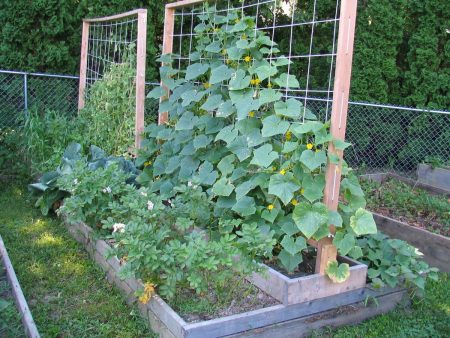
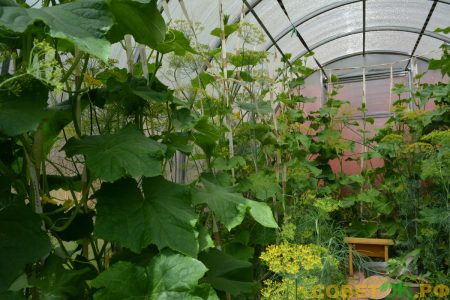
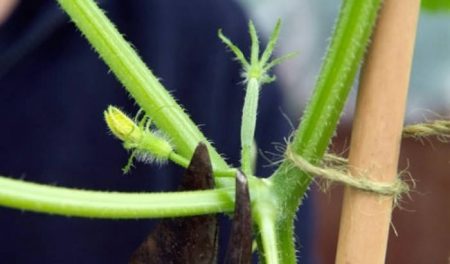
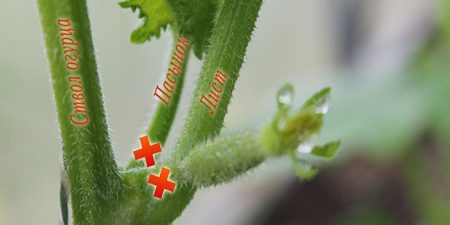
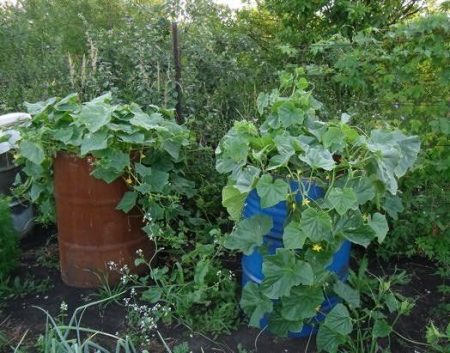
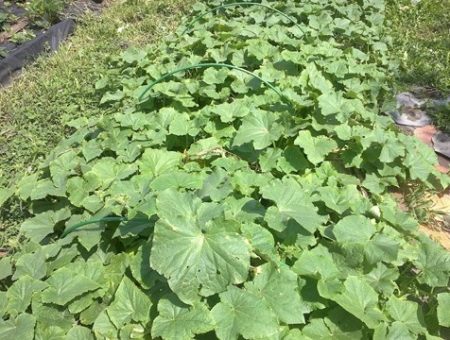
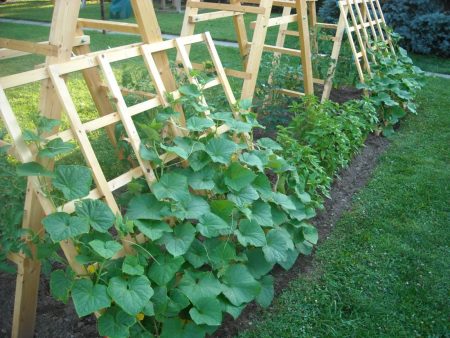
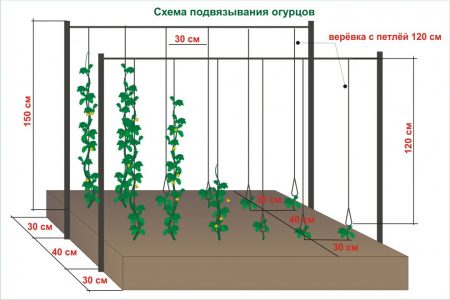 It is used both in open and protected ground. The plants are tied to the trellis with twine. Do not tighten the loop on the stem, otherwise, as it grows, the twine may pull the stem. The top of the growing shoot is wrapped around twine every week.
It is used both in open and protected ground. The plants are tied to the trellis with twine. Do not tighten the loop on the stem, otherwise, as it grows, the twine may pull the stem. The top of the growing shoot is wrapped around twine every week.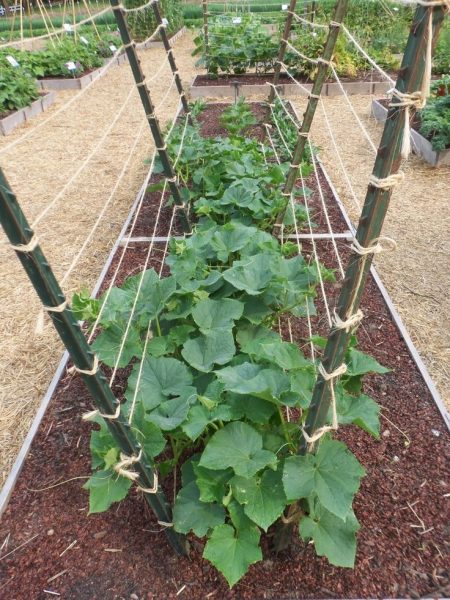 used in open ground. The twine is stretched horizontally along the bed in several rows. The main stem is immediately tied to the top row, and the side stems to the horizontal rows, depending on what level they are at.
used in open ground. The twine is stretched horizontally along the bed in several rows. The main stem is immediately tied to the top row, and the side stems to the horizontal rows, depending on what level they are at.

 (11 ratings, average: 3,73 out of 5)
(11 ratings, average: 3,73 out of 5)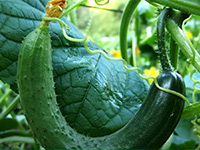 CUCUMBERS NEVER GET SICK, I'VE BEEN USING ONLY THIS FOR 40 YEARS! I SHARE A SECRET WITH YOU, CUCUMBERS ARE LIKE THE PICTURE!
CUCUMBERS NEVER GET SICK, I'VE BEEN USING ONLY THIS FOR 40 YEARS! I SHARE A SECRET WITH YOU, CUCUMBERS ARE LIKE THE PICTURE!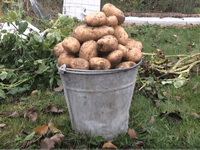 You can dig a bucket of potatoes from each bush. Do you think these are fairy tales? Watch the video
You can dig a bucket of potatoes from each bush. Do you think these are fairy tales? Watch the video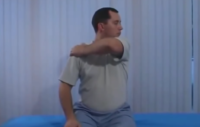
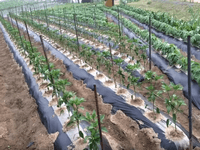 How our fellow gardeners work in Korea. There is a lot to learn and just fun to watch.
How our fellow gardeners work in Korea. There is a lot to learn and just fun to watch.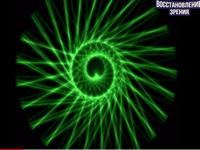 Eye trainer. The author claims that with daily viewing, vision is restored. They don't charge money for views.
Eye trainer. The author claims that with daily viewing, vision is restored. They don't charge money for views.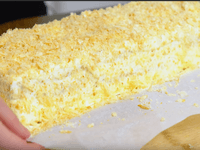 A 3-ingredient cake recipe in 30 minutes is better than Napoleon. Simple and very tasty.
A 3-ingredient cake recipe in 30 minutes is better than Napoleon. Simple and very tasty.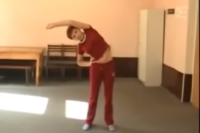 Therapeutic exercises for cervical osteochondrosis. A complete set of exercises.
Therapeutic exercises for cervical osteochondrosis. A complete set of exercises. Which indoor plants match your zodiac sign?
Which indoor plants match your zodiac sign?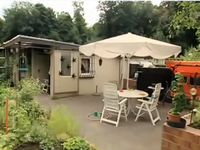 What about them? Excursion to German dachas.
What about them? Excursion to German dachas.